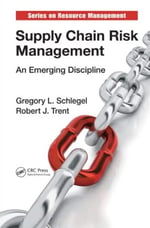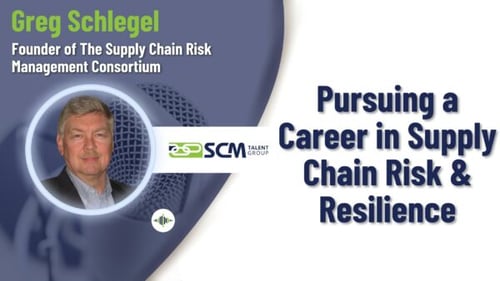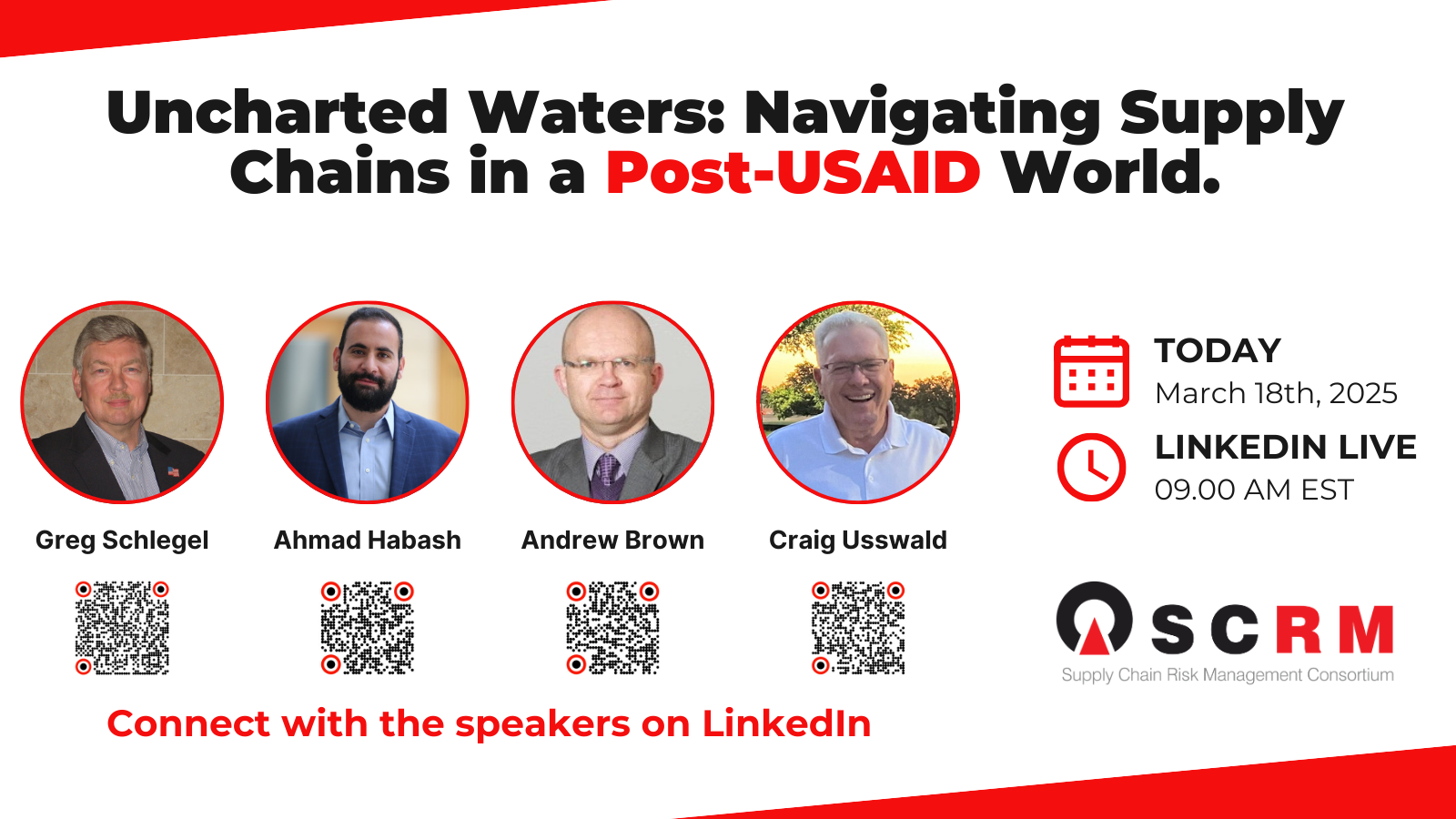Analyst Insight: The supply chain landscape in the world of humanitarian healthcare is as complex...
SCRM Consortium Resources

Access the SCM Risk Assessment Tool mentioned in "Supply Chain Risk Management, An Emerging Discipline" by Gregory L. Schlegel and Robert J. Trent:
Purchase "Supply Chain Risk Management, An Emerging Discipline" by Gregory L. Schlegel and Robert J. Trent:
Articles
Analyst Insight: Supply chain executives are developing their 2025 strategies to contend with...
Analyst Insight: After three years of pandemic-driven disruptions, supply chain executives in...
Download the Article from Change Magazine
Watch previous webinars & Subscribe to our Channel
Uncharted Waters: Navigating Supply Chains in a Post-USAID World
The speakers have answered all the questions from the session. if you would like to ask more email info@thescrmconsortium.com
| Speaker | Question/Comment | Answer |
| Barry Chovitz | How could USAID have done "better " particularly on transition away from dependence? | USAID has been moving away from country government dependance through a focus on localization and better equipping country organisations to to be able to transform health supply chains. There is some argument suggesting that USAID could have requried governments to put more local funding into the purchase of health products than they have. Historical examples have been the way GAVI worked with Pakistan and India (There are other examples too), to gradually withdraw funding over an agreed timeframe and for those countries to support their own purchase of vaccines. |
| Craig Usswald | Great question | The Global Fund "graduation" model is a good example of finite conditional dependency on AID funds. However that also created some perverse incentives to not graduate, and face the cliff of self reliance. |
| Barry Chovitz | Supply chains have long procurement lead times. Doesn't it seem likely that health programs will collapse, not now, but when supplies run out, and there is nothing to replenish it? | Answered in session. Thanks Barry and Jean-Marc you are both correct there is a disaster unfolding now ... expecting 160k plus deaths from malaria in next 12 months, 100 of 1000's HIV deaths and one million extra deaths from vaccine interruptions.... assuming the gaps made due to USAID funds withdrawal are not filled... (source immediate past assistant administrator USAID).... an immediate humanitarian crisis for certain....to which we can expect some reaction from UN agencies .... in parallel a new normal needs to settle with all that is being shared forming part of what may be possible in country contexts... |
| Jean-Marc VANDER STICHELEN | As already mentioned, no other donor will be able to pick up from USAID. As such, am afraid that even if local governments would immediately reallocate funds to cover the needs of their populations they will need too long to set up systems in place to avoid treatment interruption for people living with HIV, or timely supply of anti-malaria medicines for examples. | |
| Barry Chovitz | I wonder if ministers/politicians will be willing to say that services will be impacted and can convene private-sector actors and share demand info. | Within our discussion we emphasised the need for country governments to take a leading 'stewardship' role to address local issues. This rtole should enagge all country stakholders. |
| Barry Chovitz | Maybe the private sector can, if they know there is a market, step in w/support. | |
| Steve Thomas | Countries need to be trained in how to manage their supply chain. They need to learn to operate like the private sector, using a P&L and managing their cost. | |
| Craig Usswald | Good observations Steve | One could say that the "being trained in how to manage their supply chain" has been the idea all along. We have seen some countries embrace the private sector, but now, as you rightly observe, its their life raft to stability, maybe the forward thinking ones will seize the moment. However I cannot help thinking that some cohort of seasoned professionals needs to facilitate the conversation and ask the hard questions in the forums which are established in each country. Above all, these forums need to be championed by the highest authority possible. |
| Dr Andrew N Brown | Thanks Barry and Jean-Marc you are both correct there is a disaster unfolding now ... expecting 160k plus deaths from malaria in next 12 months, 100 of 1000's HIV deaths and one million extra deaths from vaccine interruptions.... assuming the gaps made due to USAID funds withdrawal are not filled... (source immediate past assistant administrator USAID).... an immediate humanitarian crisis for certain....to which we can expect some reaction from UN agencies .... in parallel a new normal needs to settle with all that is being shared forming part of what may be possible in country contexts... | |
| Wilson Chandomba | Greetings Graig and Prof Brown I am Wilson from CMCOMMS in Africa, Zimbabwe | |
| Craig Usswald | Hello Wilson, glad you made the time to join the conversation | |
| Dr Andrew N Brown | African Resource Center Outsourcing Toolkit...Great resource.... | |
| Wilson Chandomba | IAPHL we are available and ready to promote the agenda of Health Supply Chain Systems Strengthening , in Southern Africa we have been rolling out our programs pro-bono. | |
| Wilson Chandomba | if so how can they be funded and what the envisaged sustainability model | |
| Wilson Chandomba | Beyond the USAID withdrawal what sort of programs can continue like Health Systems Strengthening , PSS? | Answered in session. |
Greg Schlegel talks Supply Chain: Explosions, Risks, and Universities with Ulf talks Supply Chain
In this episode of Supply Chain Pioneers Greg Schlegel, founder of the Supply Chain Risk Consortium and co-author of the book 'Supply Chain Risk Management and Emerging Discipline.' talks supply chain. Greg shares his extensive experience in supply chain management and risk, detailing his journey from a practitioner to an academician.
They discuss the evolution of supply chain risk management, the importance of integrating modern technologies like AI/ML, and the significance of culture in risk management. The conversation also delves into Greg's career shifts, IBM's innovative cycles, and practical steps for companies to improve their supply chain risk management within 90 days.
Mitigating China Supply Chain Issues in 2023 | Optilogic
Today, US companies are more hesitant than ever when it comes to manufacturing in China. Ongoing trade tensions push many US companies to re-evaluate supply chains and diversify sourcing options to remain resilient in the face of uncertainty.
Many companies are actively reducing reliance on Chinese manufacturers. The current sentiment toward China’s supply chain is apprehensive at best.
Optilogic Introduces Personalized Risk Profiling in Cosmic Frog Supply Chain Network Design Platform
Supply chain design software innovator Optilogic today announced personalized risk profiling, available as part of its Cosmic Frog supply chain network design solution. Cosmic Frog is the fastest network design solution and provides a risk score on every scenario to help companies proactively minimize risk and volatility.
LEORON Institute | Episode 51: Supply Chain Risk Management & Resilience
Podcast: Pursuing a Career in Supply Chain Risk and Resilience – with Founder of The Supply Chain Risk Management Consortium



